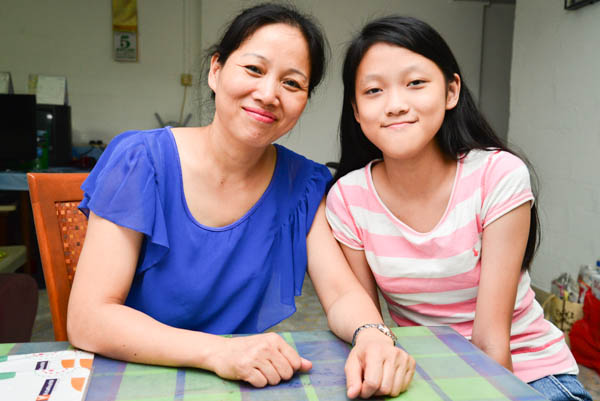 Ong Soh Cheng started volunteering in Tzu Chi’s recycling, education and charity activities in 2011 and discovered her value and purpose in life in the process. (Photo by Ong Saw Tin)
Ong Soh Cheng started volunteering in Tzu Chi’s recycling, education and charity activities in 2011 and discovered her value and purpose in life in the process. (Photo by Ong Saw Tin)
Every Tzu Chi volunteer has their own heart-moving stories, and Ong Soh Cheng is no exception.
In 2009, Ong came to know Tzu Chi after signing up for a yoga class at its Jing Si Hall in Pasir Ris. She subsequently became a Tzu Chi donating member. At that time, Ong was plagued by a heart disease and travelled frequently to the hospital. She was very low in spirits and had completely lost her confidence and interest in life. Her attitude towards Tzu Chi was lukewarm.
Ong recalled a question that her son asked her during the period when she was a frequent visitor to the hospital: "For how long do you want to live this way?" It made her sink further into despair. Despite feeling very upset with his words, she realised that she could not continue feeling depressed anymore.
With continuous encouragement and support from Tzu Chi volunteers, she made up her mind to face life with positivity and to engage in Tzu Chi’s activities wholeheartedly.
In 2011, Ong started actively participating in Tzu Chi's recycling, education and charity activities. As she increasingly visited needy households (Tzu Chi’s aid recipients), she gradually emerged from despair and found hope and value in life. She also noticed that she seemed to feel less discomfort from her illness while her joy had increased.
Ong shared that Tzu Chi had given her the strength to start life anew and rise from the lows in life. The charity home visits made her realise that that giving brings one joy and makes one rich in the heart.
 Ong Soh Cheng (first row, second from the left) participates in the monthly Tzu Chi Charity Day with other volunteers, to give care to needy aid recipients in their homes. (Photo by Chua Teong Seng)
Ong Soh Cheng (first row, second from the left) participates in the monthly Tzu Chi Charity Day with other volunteers, to give care to needy aid recipients in their homes. (Photo by Chua Teong Seng)
 Ong Soh Cheng joining a “Medicine Buddha Sutra” book study at Tzu Chi (Photo by Chan May Ching)
Ong Soh Cheng joining a “Medicine Buddha Sutra” book study at Tzu Chi (Photo by Chan May Ching)
Learning to be content and to cherish blessings
Ong shared the moving story of a Tzu Chi aid recipient she once visited. The aid recipient was an old man who was afflicted with a lingering disease, so he had to lie in bed for a long time. His illnesses had not only brought unbearable pain to him, but also affected his ability to speak. He could only write simple sentences on a small white board when he wanted to communicate with Tzu Chi volunteers who visited him.
Once, when a volunteer asked him about his physical condition, his reply shocked Ong—he said that, except his hair, his entire body was in pain. And he always took painkillers before the volunteers arrived to visit him, hoping to relieve his bodily pain so that he could spend some happy moments with them.
What was even more touching was that, every morning, the elderly man insisted on going out to buy breakfast for his children with the very last bit of energy he still had. It was a gesture of love for his family. The act of buying breakfast is nothing special for ordinary folks, but it was very exhausting for the elderly man as he had to lie in bed for long hours to regain his energy after returning home.
A few months later, the man was hospitalised as his condition deteriorated. Tzu Chi volunteers went to the hospital to celebrate his birthday with him on his birthday, however, his daughter was unable to join the celebration as she had to attend to some matters.
Ong remembered that he wrote the words “Thank you, Tzu Chi” repeatedly on his small white board and peacefully passed away at night on the same day. His daughter felt sad and sorry for not being able to attend his birthday celebration, but she was very thankful to Tzu Chi for all that it had done for him and for the volunteers’ care and company along the way.
This home visit experience made Ong realise that Tzu Chi volunteers were just like the family members of the elderly aid recipient, though they were unrelated by blood. The volunteers had given him and his family complete care and stayed by his side till his last day, allowing him to experience human love and warmth.
Ong was also deeply touched by how he exhausted all his energy to go outdoors and buy breakfast for his children to show his love for his family. She finally understood why Tzu Chi volunteers address the needy aid recipients as "households of gratitude”.
This is not for the sake of wanting the aid recipients to thank Tzu Chi for its help, but rather a reminder for the volunteers to thank the needy for allowing them to witness the sufferings of life, i.e. poverty, illness and disabilities, and to learn valuable life lessons. The volunteers thus learn to be content and count their blessings in life, and grow in wisdom.
As a Tzu Chi home visit volunteer, Ong feels that she should follow Master Cheng Yen’s teaching of showing compassion to all equally by lending a helping hand to needy households in the society with all of her love, and to give loving care and warmth to others.


